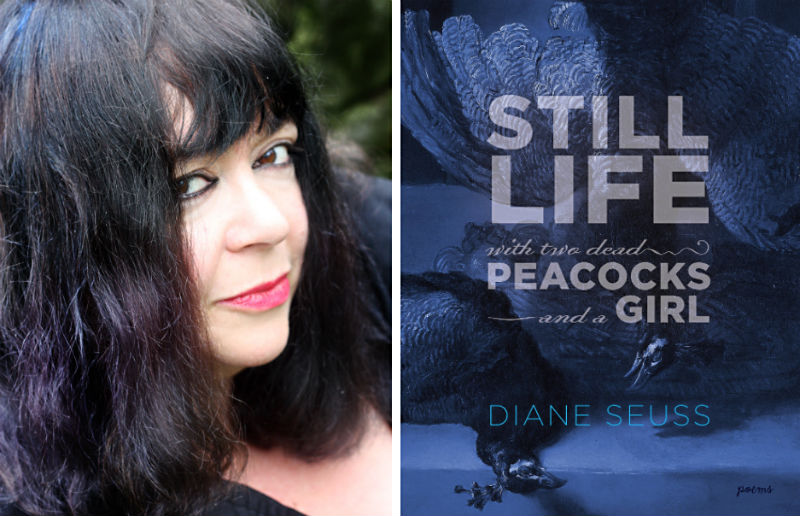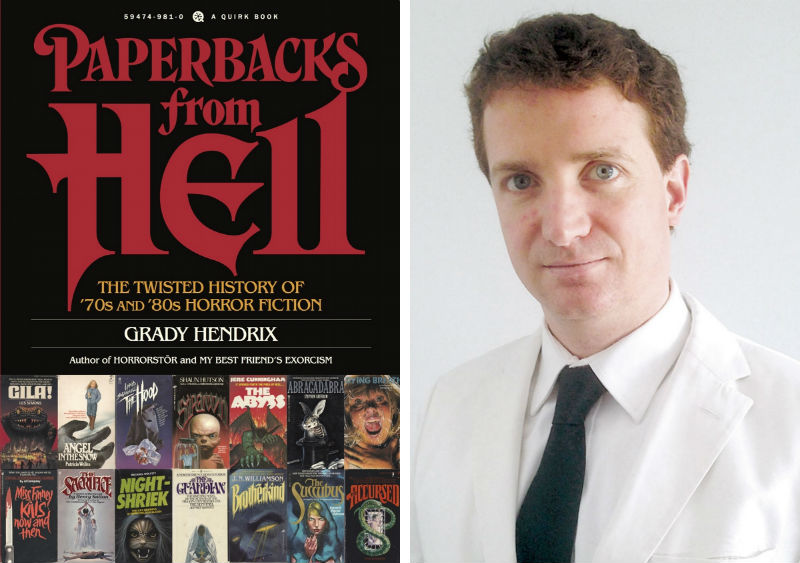"Silencer" Spring: Ann Arbor native and poet Marcus Wicker at AADL

On April 20, Ann Arbor native, Marcus Wicker came to AADL to talk about his latest poetry collection, Silencer.
And if it weren’t for Kehinde Wiley, the prolific black painter most recently in the news for his portrait of President Barack Obama, there’s a chance that this event wouldn’t have happened.
The cover of Silencer prominently featured one of Wiley’s paintings, which is what drew AADL staff member and program host Sean Copeland to the book as he was working at the library. Copeland, not a poetry superfan, took the book home, read the work, and knew that others should experience it. (Read Copeland's interview with Wicker here.)
Over 30 people attended the Friday night event on what turned out to be the first spring-like day Ann Arbor had seen in a while. Wicker, in fact, remarked on that saying to the crowd, “It’s a Friday and you came here to see poetry. You could be on a lawn somewhere drinking beer.” (Video of the event coming soon.)
Loud and Clear: Marcus Wicker's socially conscious "Silencer" poems are anything but quiet

Marcus Wicker's poetry doesn’t mince words. He keeps it real.
Mixing hip-hop rhymes with poetic prose, Wicker's books deal with tough topics such as racism, classism, and police brutality -- subjects American society swiftly tries to hide from. Wicker, an Ann Arbor native, challenges those in power with every phrase he puts on the page.
A Pushcart Prize winner and two-time NAACP Image Award nominee, Wicker received fellowships from Ruth Lilly and Cave Canem to name a few and has written articles that have appeared in The Nation, Oxford American, and Boston Review. He currently teaches in the MFA program at the University of Memphis and is the poetry editor of Southern Indiana Review.
All accolades aside, the most impressive things about Wicker are his ability to call readers to action and his ability to mix modern communication and hard-hitting wit within his work. He even injects humor as a great contrast to the serious topics.
Still Lifes Are Anything but Still: Poet Diane Seuss at Literati

"Self Portrait with the Ashes of My Baby Blanket":
Ashes because she set fire to it in the burn barrel.
Leave her alone, with your newfangledness.
I was a clingy, fearful thumb-sucker, and she knew I needed reinventing.She tore it away and I screamed and she burned it.
Begone, soft, pale yellow. She knew if I kept it I’d stumble over it
The rest of my life, how far I would travel without it,And how many strange birds I would trap
in the story of its burning.
At a Literati reading this past Friday, poet and professor Laura Kasischke introduced Diane Seuss by reading one of her poems, “Self Portrait with the Ashes of my Baby Blanket.” The poem centers on Seuss’ mother, who is an important figure in her new book of poems, Still Life with Two Dead Peacocks and a Girl. The first and last poem, "I Have Lived My Whole Life in a Painting Called Paradise” and “I Climbed Out of the Painting Called Paradise,” introduce the reader to a heavenly, creative world that Seuss is able to inhabit but one that her mother, who is not a writer, cannot. Seuss “leaves” the painting to rejoin her family at the end of the book.
Pat Thomas reconstructs the revolutionary history of Jerry Rubin in "Did It!"

As an archivist, Pat Thomas is focused on letting the subject speak or sing unadulterated. So, whether it's working on album reissues for the Light in the Attic label and others, or writing about the Black Panthers and other political movements, Thomas wants voices and ideas to be presented as the artists and activists intended.
Thomas' latest search for the truth is Did It! From Yippie To Yuppie: Jerry Rubin, An American Revolutionary, which follows his other graphics-heavy book for Fantagraphics, Listen, Whitey!: The Sounds of Black Power 1965-1975.
Our Secret Stories: "Notes From a Public Typewriter" captures anonymous odes & anecdotes

When Michael Gustafson, co-owner of Literati Bookstore with his wife, Hilary, put a typewriter out for public use in the basement of the store, he wasn’t sure what would come of it.
"There was no concrete plan,” he says. “It was more of an experiment.”
Literati’s logo features a typewriter based on a Smith Corona that Gustafson inherited from his grandfather, and he decided it would be fun to give customers the chance to use a typewriter when they visited the store.
He had no idea it would be as popular as it is.
Catch-"13": A2 author Michael A. Ferro's new book is a satire & character study of Midwest Americans

Some authors would give their right arm for a book deal. Others would give a kidney or two.
Author Michael A. Ferro gave an eye.
“It started when I noticed that I couldn’t see out of my left eye,” Ferro says. After a visit to the emergency room (following a quick stop to Google the symptoms), the Ann Arbor-based Ferro learned he had Central Serous Chorioretinopathy. This disease largely strikes men between the ages of 30-50, and while its exact cause is unknown, it's believed that stress plays a major part -- for instance, the enormous stress and hard work associated with publishing a book.
On the positive side, that stress and hard work produced a spectacular debut novel called Title 13.
All Guts, No Glory: Grady Hendrix presents even more "Paperbacks From Hell"

My goal with Paperbacks From Hell was to present the full bonkers experience of reading '70s and '80s horror paperbacks without any of the brain damage. As a result, readers -- and those who come to the Paperbacks From Hell LIVE experience on Thursday, March 29 in Ann Arbor -- get to briefly experience books like John Christopher’s The Little People about an Irish B&B overrun by Nazi leprechauns, they get a taste of Joseph Nazel’s innercity take on William Peter Blatty’s horror novel in The Black Exorcist, and they even get to try The Glow, a sort of Rosemary’s Baby about a young couple who move into a building of health-nut vegetarians who want to steal their blood to lower their cholesterol levels.
My only regret is that Paperbacks had to end before I could cover all the other insane books out there. Presented here for your education are five of the paperbacks that got away.
Nervous Breakthrough: Ann Arbor novelist Camille Pagán's "Woman Last Seen in Her Thirties" explores loss & change

Ann Arbor-based novelist Camille Pagán (Forever Is the Worst Long Time, Life and Other Near Death Experiences) was in the midst of writing a book that wasn’t going anywhere when she had an unnerving grocery-store experience.
“This guy, a college kid ... bumped into me and didn’t even look at me or say anything,” said Pagán, who also noted that on other occasions while out shopping, she’d observed “when a cashier would talk to and make conversation with a middle-aged man but then not talk to the middle-aged woman who was next in line. This seemed to me to really be saying something about our society and how we view and treat women as they age.”
Exist & Resist: U-M's Yoni Ki Baat group encouraged women of color with "Resistance"

On March 9 and March 10, Yoni Ki Baat, an organization that seeks to educate the campus about the issues pertaining to South Asian women and all women of color, produced Resistance, a show inspired by Eve Ensler’s Vagina Monologues.
In fact, Yoni Ki Bat is Sanskrit for “talks of the vagina.”
Below the Borscht Belt: U-M's Eileen Pollack & her "Bible of Dirty Jokes"

A cousin who runs a Vegas strip club? A beloved brother who goes missing while in Vegas? A late husband who wrote dirty jokes for a living? A heroine with a failed stand up career who must save the day?
These colorful characters make up the new book The Bible of Dirty Jokes by U-M professor Eileen Pollack, but the roots of the novel come from a different era.
“I grew up in a hotel in the Borscht Belt," Pollack says. "It's really where stand up comedy got its start. Famous comedians would perform there, creating this sort of culture, and that’s what I knew.”


































